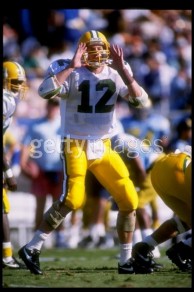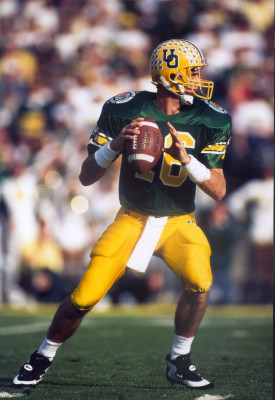
Danny O’Neil throwing a pass in the 1994 Rose Bowl
It was a year with such high promise, raised expectations from two consecutive bowl appearances, and a roster stacked with NFL-caliber talent. By the end of the 1991 Oregon football season it was a year better left forgotten by many, one riddled with injuries and disappointment, a time when the harsh reality emerged that the program still had some growing pains before officially arriving.
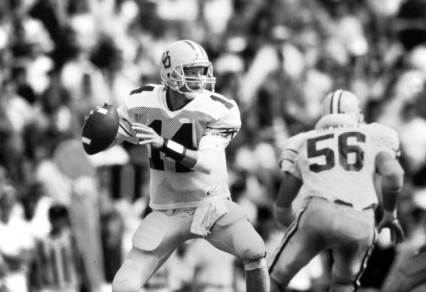
Bill Musgrave had shattered every passing record at Oregon during his career (86-90), replacing him proved difficult
As fans there are certain years that can be recalled for the initial promise of excellence, leading only to eternal questions of ‘what-if’ had injuries or bad circumstance not occurred. What if Stanford hadn’t blocked two punts in 2001, would Oregon have won the national championship? What if Reuben Droughns’ leg not broken in 1998, the Ducks looked invincible prior to big #22’s leg buckling along the sideline. What if Dennis Dixon’s knee ligament hadn’t torn on the wretched crabgrass of Arizona Stadium in 2007, would the Casanova Center today hold a Heisman Trophy and national championship?
All of these are valid questions for both fans and the former players who experienced it first-hand to ponder, but years before these painful memories, 1991 defined the tragic circumstance of a promising season shattered.
There was reason for great optimism following the 1990 season, the Oregon Ducks had just narrowly lost the Freedom Bowl by an inch after winning the Independence Bowl vs. Tulsa the year prior.
Many of the players that had led Oregon to those bowl games were gone to the NFL: Derek Loville, Latin Berry, Tony Hargain, and arguably the greatest player in Oregon history-Bill Musgrave.
Yet while the Ducks had to decide who would replace the Musgrave legacy, the defense had seven players in the rotation who would go on to make NFL rosters, and the offense featured future pros like Ronnie Harris and Jeff Thomason, leaving high expectations for the next season. It was unknown exactly who would play quarterback, but despite a definitive signal caller there was no hesitation from fans to expect that the 1991 Oregon Ducks should again be bowl bound. The talent was there, all that was left was to prove it on the field.
“Going into fall camp and daily doubles, I was looking around thinking ‘Wow we’ve got some great people!‘” said Tony Koker, a backup linebacker to start the season who would see extensive playing time as the season progressed. “Sean Burwell had just come off a darn good season, we had Jeff Thomason and Ronnie Harris on offense, and talent all over the defense.”
All eyes were on who would replace Bill Musgrave, who had broken every passing record at the University of Oregon, and drafted by the 49ers following the 1990 Freedom Bowl loss. A five-player battle would take place for the job in fall camp—Danny O’Neil, Kyle Crowston, Michigan transfer Doug Musgrave (Bill’s younger brother), JC transfer Brett Salisbury, and local product Bob Brothers, who had played some in years prior but coaches thought would be better utilized as a wide receiver.
“It was pretty exciting,” Kyle Crowston remembers of the quarterback competition. “We were all chomping at the bit to see if we could get the job, we all had a shot at it.”
As camp developed, the competition remained fierce though it appeared that Danny O’Neil, who spent the 1990 season as Musgrave’s backup, had a slight edge in camp while Salisbury recovered from hernia surgery.
“I had backed up Ty Detmer at BYU, who was probably the best quarterback I had ever seen in the clutch,” Brett Salisbury recalls. “He (Detmer) had won the Heisman Trophy the year I was at Palomar Junior College, so the competition against a bunch of young guys (at Oregon) didn’t play a role in my mind when I made my recruiting trip. I could see Danny was separating himself from those guys, but didn’t worry much until fall camp. Unfortunately I didn’t get much of a chance to prove myself because of a ruptured hernia early on. I was getting snaps with the first team and at that time I simply wanted to be an asset, not a liability.”
Salisbury’s injury setback proved an omen for how the season would progress, a team with a lot of talent but riddled with medical problems, never getting a chance to get fully comfortable.
The season started off well, hosting a Washington State team led by a young Drew Bledsoe, the Ducks stomped the Cougars 40-14. O’Neil in his first start for Oregon was a little sporadic at times, but the quality talent on the defense and hard-running of tailback Sean Burwell more than compensated for the inexperience at quarterback.
However the game took its toll, as multiple starters couldn’t finish the game suffering injuries. There would be more to follow.
Week 2 Oregon traveled to Texas Tech, a team featuring a behemoth of a running back in Bam Morris, who would become a star in the NFL with Pittsburgh and Kansas City before drug issues landed him in jail. Again the Ducks rolled, defeating the Red Raiders 28-13, but it proved a pyrrhic victory at best as more starters, particularly along the defensive line, went down.
Then reality struck. With the Ducks 2-0, a trip to Utah seemed like a sure win, setting them well on the path to a third consecutive bowl game. But the youth showed, and injuries lingered. Out were many along the starting defensive front seven, as well as starting tailback Sean Burwell. The defense played well, and special teams came through with a blocked punt; but two first quarter turnovers proved too much to overcome, as Oregon lost a heartbreaker to the Utes 24-17.
While just one loss, it proved devastating, one that a young team never seemed to overcome for the rest of the year.
Now 2-1, Oregon hosted USC at Autzen Stadium. During the first half Danny O’Neil struck his throwing hand on a helmet, dislocating his thumb. Hiding it from coaches, he continued to play, popping his thumb back into place after each snap. However eventually coaches did notice, and O’Neil’s day was done.
In for O’Neil in the 2nd half stepped Brett Salisbury, now recovered from his hernia, but lacking in enough practice reps to be fully comfortable in Oregon’s pro set rather than the spread system he had run in 1990. Still, Salisbury was a quality talent with a pedigree name (his brother Sean was a quarterback with the Minnesota Vikings at the time), his Palomar JC squad the year prior had led the nation in offense. Salisbury and the Ducks fought hard, but could not gain enough offensive consistency to keep pace with the Trojans, losing 30-14.
Now 2-2, Oregon’s season was suddenly sharply veering off course, with multiple backups thrust into starting roles. The Ducks would get a respite of sorts, as hapless New Mexico State came to town next, with O’Neil feeling healthy enough to return to the starting role. However the thumb injury would be aggravated, this time ending O’Neil’s season.
With O’Neil and Salisbury looking like the solid rotation at QB for the year, Kyle Crowston had asked for a position switch to see the field. “I had been recruited by WSU to play safety, but I wanted to play quarterback so I chose Oregon over an offer to play QB at Hawaii. But with Danny and Brett playing I told coaches to switch me to safety, and I played in the New Mexico State game, but once Danny got hurt I was moved back to quarterback.”
…And then there were four.
Brett Salisbury again took over, and led the Ducks to an easy 29-6 victory over NMSU. But to many of the Ducks the 3-2 mark, multiple starters lost to injuries, and 23-point victory didn’t leave them feeling very good about the season.
“We were disappointed when we only beat New Mexico State 29-6, we thought we should have put 50 on them,” said Tony Koker. ”It was frustrating, we started off 2-0 and then injuries just destroyed us. It was frustrating as a player, and I can understand how devastating it would be as a fan to have gone through it. Back then it didn’t matter that much to me what everyone was saying back then, but now as a fan I can relate to that a bit more. There’s always the expectations, and I knew that as a player, and we wanted those expectations because we wanted that success just as much as anyone else. Sometimes when you get into a season like that it’s a snowball effect, one thing just happens after another.”
While perhaps unrealistic to expect great things from inexperienced quarterbacks so early, there were heightened expectations (fair or not) due to the success of their siblings. While Salisbury and Musgrave would never admit it as a factor, from the outsider perspective there were high hopes for the two transfer QBs battling for the vacated starting role due in large part to the names adorning the back of their jerseys. The Salisbury name was already familiar to NFL fans with Brett’s brother Sean playing for the Vikings, and the Musgrave name was considered royalty in Eugene. It was difficult not to compare everything that Brett & Doug did to their elder siblings Sean & Bill.
“They were both very talented, Brett and Doug,” said Crowston. “Doug is very smart, he’s a doctor now, and Brett threw a really nice ball. Doug was a student of the game, but trying to live up to Bill’s legend, especially early on his first season, that’s tough to do. You’d have to imagine that the extra pressure was there in the back of their minds even if they didn’t acknowledge it.”
“We as players read just like all the fans do, so when Doug Musgrave’s player profile came out we saw he broke all of Bill’s records in high school and we thought he was going to do great,” Koker remembers. “But Bill and Doug were totally different people, Bill was fantastic, coolest guy ever. Doug was very introverted, kept to himself, didn’t handle the limelight as well. Brett was the same way, we read the press and certainly had expectations because of the Salisbury and Musgrave names. We’re more realistic though because we’ve been there and we know what it takes, we see the people who glide through and the people who fight hard and find success. We know that we’ve read these things, but they still had to prove themselves, the records they broke elsewhere don’t translate to our offense and the Pac-10 level, but as teammates there were expectations.”
Salisbury would get the nod initially in the now four-man battle over Musgrave, the fleet-footed scrambler Crowston, and local hero Brothers.
While Salisbury made some plays, the day would prove a disaster, as Oregon’s defense collapsed against the tough running of Cal superstar RB Russell White, and the Duck offense couldn’t find a good rhythm. Sensing a need for a spark and lacking full confidence in their new QB, Oregon coaches pulled Salisbury in favor of Doug Musgrave. Again, only sporadic success would emerge, while Bob Brothers now converted to wide receiver would find some playing time making a few catches at the end of the game.
The next week it would be Doug Musgrave getting the very weak vote of confidence to start, as the Ducks headed north to face top-ranked Washington. Despite the daunting task of taking on the #1 team in their house, the Ducks felt the sense of urgency to turn the season around, and what better time than against the hated Huskies? Four key starters were missing on defense, though the secondary was still intact, and Oregon welcomed back on offense fullback Juan Shedrick and tailback Sean Burwell. If the 1991 season was to be salvaged, this would be the day to make their mark.
There had been player-only meetings to address the situation. The defense, led by tremendous talents like Eric Castle and Muhammad Oliver, recognized that it was time to step up and take over with the offense struggling trying to find consistent play from the quarterback rotation.
“As a defense, we tried to really put it on our shoulders,” said Koker. “We weren’t naive to think that we could have all these injuries and changing quarterbacks and it wouldn’t effect things, but we knew we had to get in the driver’s seat and take over games more so to pick up the slack. We had more player-only meetings that year than any time I can recall. It wasn’t about finger-pointing though yes there were frustrations, rather it was trying to figure out what we could do.”
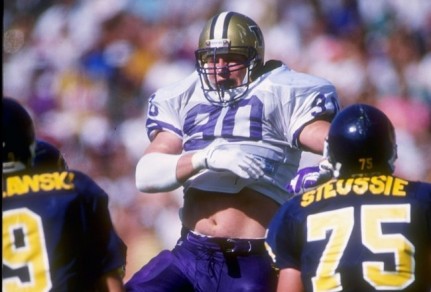
Steve Emtman anchored UW’s touted defense, culminating in a national championship in 1991 and #1 overall NFL draft pick
Washington’s defense was as good as there was in the country, led by #1 overall draft pick Steve Emtman. While the Oregon defense played well, UW gave up no ground with Musgrave at the helm. So again coaches pulled the QB, this time trying to find a spark with Kyle Crowston, who could make plays with his feet as well as with his arm.
“I really wish we could have that Washington game over,” said Crowston of the missed opportunity. “I came in and I thought I was a couple plays away from having a pretty good game against the #1 team in the country, but I made a few stupid plays, and it cost us. We had our chances, but a team like that you can’t give them many opportunities. Part of it was the inexperience, when you don’t have game experience you tend not to make those necessary snap decisions, the game is going so much faster. Ironically, after that Washington game was when I started getting comfortable, the game started slowing down for me, but the next week against Stanford I was sat down in favor of Bob Brothers and I didn’t see action again for the rest of the year.”
Oregon fought hard against the Huskies, the defense forcing several turnovers and keeping one of the most dominant teams in the country to a manageable score. But the Huskies had no fear of the Ducks offensive attack, and stifled their opportunities to make it a game. Oregon tacked on a late touchdown on a Burwell run, but when the dust settled Washington had trampled the Ducks 29-7.
“The Washington game sticks out to me more than any other,” Koker recalls. “We were really up for that game, it being a rivalry, and we wanted to turn things around, but it just didn’t come together and you could see us struggling, it was a brutal game.”
The remainder of the season was much of the same, coaches grasping at straws trying to find any consistency whatsoever out of their quarterback rotation, while more players fell victim to injuries. By the time the season drew to a close, the Ducks were a shell of the team that looked to hold so much promise against WSU to open the year.
Salisbury, Musgrave, and Brothers (now switched back to QB from WR) would all see action in the remaining games, with little to no offensive consistency, while Crowston could only watch the futility from the bench after starting the Stanford game the next week but proving ineffective. The frustration from coaches was evident, quick to pull a player for the next, leaving the quarterbacks struggling trying to force plays wondering if the hook would come after every 3-and-out if they didn’t do something spectacular.
The Ducks went on a six-game losing streak, never winning another game after NMSU finishing 3-8, the worst finish under Coach Rich Brooks since 1982’s 2-8-1 season. The cumulative points scored over the six-game stretch to close the year was only 58, many of those coming on defensive and special teams scores. But the defense had kept it close, the final four games being lost only by a combined 43 points. The Ducks played tough, but limped to the finish line closing out the season with close losses to Stanford, ASU, UCLA, and OSU.
The Ducks weren’t being blown out, but in every game the inability of the offense to move the chains or put points on the board proved too difficult of a task for the battle-weary defense to overcome every week.
“It was tough on everyone,” Salisbury lamented. “However, I always have the lock and load approach. If one guy goes down, you have to replace him with talent. We couldn’t do that. We didn’t have the depth of the teams today. When Sean Burwell went down, we went to a walk-on tailback who had never played a down of college football at the Division-1 level. It’s tough to get a rhythm if you continue to change the quarterback. The offense only gels when they know who their leader is.”
Fans had grown to expect a winner, a team of scrappers that would come through in the clutch. 1991 by the wins/losses mark proved a dismal failure, yet amidst the hard lessons were stories of great individual performance and achievement through adversity.
As the season wore on, two starters in particular in the secondary took it upon themselves to carry the team. Safety Eric Castle and cornerback Muhammad Oliver were astounding talents who would go on to lengthy NFL careers. Following the New Mexico State win recognizing the inevitable offensive struggles to come, both players knocked up their level of play to another level to compensate.
The two would have multiple interceptions, score multiple touchdowns, block multiple punts keeping Oregon close in many of the games down the stretch. Against ASU, Oliver’s punt block and return for a TD was one of the top highlights of 1990s, coinciding with a Castle pick-six earlier, the two plays almost single-handedly winning the game for Oregon if the offense had managed to capitalize on some of the turnovers the defense forced against the Sun Devils.
“Muhammad and Eric both really shined that year, I don’t know who was faster, both were lightning quick,” Tony Koker remembers fondly of his teammates, particularly Castle, the two close friends (Koker & Castle) having grown up together in Lebanon, OR. “Those guys stepped up from their positions and did what they had to do to make plays, and when they did get their hands on the ball they had a little extra in them to say ‘I’ve gotta get this to the house because the offense may not be able to do it.’ Those guys were just studs, amongst a defense that had dwindled due to injuries, they took it upon themselves and really shined.”
“Going against that defense every day in practice was a challenge and a great motivator,” Crowston recalls, “We knew how good they were. It boosted our confidence big when were able to drive down the field and score on them in practice.”
“We would see a scout defense in practice and have our way with them, however during a scrimmage guys like Castle would make plays. They were physical and fast and that makes you better,” said Salisbury.
But the great individual play couldn’t quell the losing. Fans were frustrated, coaches and players were too. For a team that returned so many starters of a squad that had gone to back-to-back bowls, losing seasons were no longer acceptable. There had been two bowl trips in a row, and fans were eager for a third. But having to replace a quarterback, was it realistic to expect a bowl game trip for the otherwise stacked roster of talent?
Kyle Crowston isn’t sure if those goals could have been met. “It was probably pushing it with the QB question as to if we could have made it to a bowl game. It doesn’t happen very often, the odds are against a freshman or young QB taking a team to a bowl game. It could have happened if we would have stayed healthy on both sides of the ball, but obviously that didn’t happen.”
“I don’t ever like to think of the woulda-coulda situations,” Brett Salisbury responded. “We did what we did and it didn’t work out. I think it helped the team overall as they proved in the years after though.”
“You want fans to have high expectations of us, we want that as a team because we had those same expectations to perform at our absolute best,” said Tony Koker. “But realistically look at the parts…we had a good O-line, a good running back, good receivers, and a great defense; but it’s tough to win with a first-year starting quarterback, especially after guys get injured.”
These were growing pains years, harsh realities, and tough lessons learned. Yet it was the players who got thrust into the spotlight that would take the memories of the 1991 season and cultivate them into something so special that the program and city of Eugene would be forever altered.
The next season O’Neil took over as the starter once more and led the Ducks to the Independence Bowl. 1993 Oregon managed five wins, though started 3-0 until a devastating loss at Cal took the wind out of the sails. Taking to heart the experience and adversity of the 1991 and 1993 seasons, those young players who had filled the gaps in 1991 for their fallen teammates would go on to the greatest of achievements, the improbable season of 1994 where Oregon defied the odds winning the Pac-10 title earning a trip to the Rose Bowl.
That team, featuring so many young players from the 1991 team, were now seasoned veterans having gone through the toughest adversity imaginable, ready to weather any storm and persevere. Their efforts in 1994, stemming from the experiences of 1991, would be the foundation for where the program is today, now considered a perennial national powerhouse.
“I’m convinced the 1991 season helped the seasons that would follow,” said Salisbury. “When you lose you have two choices: get up or stay down. Everyone I know from that team has gotten back up and led by example. It took the ’91 and ’92 teams to get to the Rose Bowl. It made the program stronger, everyone learned from their mistakes, Danny eventually proved it leading the team to the Rose Bowl.”
Tony Koker agrees with Salisbury’s sentiments. “I always like to think that we in the ’89 – ’94 era set the cornerstone for what the program has now, obviously it has grown so much bigger with the facilities and BCS. The adversity we faced in ’91 led to the success in later years, we felt like we had a senior class with guys like Chad Cota, Danny (O’Neil), Herman (O’Berry) that came in together and grew as people and left a good thing behind for others to build upon. We started this bowl game era and through baby steps built its way up to where the program is now.”
The team in 1991 featured many players who would go on to NFL careers– Tommy Thompson, Ronnie Harris, Jeff Thomason, Romeo Bandison, Matt Brock, Matt LaBounty, Ernest Jones, Muhammad Oliver, Eric Castle, Herman O’Berry, Chad Cota. Salisbury would spend six years playing professional football overseas, and others went on to tremendous success both in football and beyond it after hanging up the jersey for good. What the team may have lacked in victories in 1991, it more than made up for in character. Having experienced the harsh adversity of ’91, there was nothing that these young men couldn’t overcome in life.
“We never gave up, there were frustrating games and situations where people could have done so, but we never stopped fighting,” Koker vehemently stated. “We did not implode as a team, we didn’t implode within ourselves. It’s such a character-builder, it’s humbling, and in the long run that creates success. There were times in ’92 things got bad but we were able to step up and turn it around, and it didn’t take an entire season to do so. We had it built into us already, because we had fought through some of the worst times a team could ever experience. We willed ourselves to be better, we had some misfortune, but we stuck it out and that culminated in the Rose Bowl.”
“Those were some of the best days of my life,” said Crowston. “There were some amazing people, and friends for life, I wouldn’t change it for the world. The whole overall experience, even in a down year, it was such a blessing to be a part of it.”
Having left the UO program after 1992 to finish out his eligibility at Wayne State, Salisbury too watched fondly as the Ducks took the harsh lessons of 1991 and turned them into a positive. “The team was fun to watch from my living room. They had a swagger and mindset about them. It’s what started the new generation of athletes to come to the U of O that would normally have ended up at places like USC. I was part of that group and proud of it.”
Brett Salisbury:
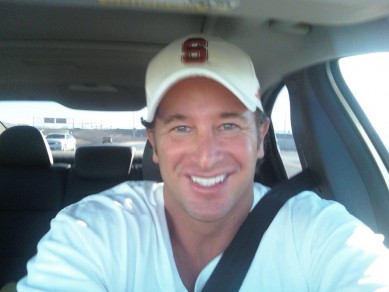 Following two years at Oregon, Salisbury transferred to Wayne State in Nebraska for his senior year. He then spent six years playing professionally, became a top male model, and has written two books, including The Transform Diet.
Following two years at Oregon, Salisbury transferred to Wayne State in Nebraska for his senior year. He then spent six years playing professionally, became a top male model, and has written two books, including The Transform Diet.
Kyle Crowston:
After the 1991 season Kyle Crowston switched to safety permanently at Oregon, backing up his roommate Chad Cota. After his Duck days Kyle spent five years working with another fellow Oregon football alumnus, Dick Winn, at Columbia River Hardwood, and coaching a middle school football team. He returned to school to acquire his masters in education, and has spent 11 years coaching and teaching physical education. As Kyle puts it, “I get paid to play now, it’s fun.”
Tony Koker:
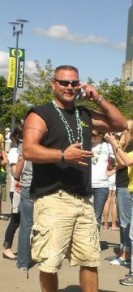 Tony Koker played linebacker at Oregon from 1990 – 1994. He is now a proud father of two athletic, competitive girls and enjoys coaching their teams. He can often be found in the stands cheering at many Oregon sports events. Now in his 16th year with the Wildish Company, he is a piping superintendent who gets to relive his past football glories often, working on the construction crews that have been a part of many projects on the U of O campus in recent years; including the construction of PK Park, the Moshofsky Center, the Autzen Stadium remodel, and the current expansion of the Casanova Center.
Tony Koker played linebacker at Oregon from 1990 – 1994. He is now a proud father of two athletic, competitive girls and enjoys coaching their teams. He can often be found in the stands cheering at many Oregon sports events. Now in his 16th year with the Wildish Company, he is a piping superintendent who gets to relive his past football glories often, working on the construction crews that have been a part of many projects on the U of O campus in recent years; including the construction of PK Park, the Moshofsky Center, the Autzen Stadium remodel, and the current expansion of the Casanova Center.
Thank you to the Casanova Center and Jeff Eberhart for assisting in organizing the interviews used for this and other content on FishDuck.com.
Related Articles:
These are articles where the writer left and for some reason did not want his/her name on it any longer or went sideways of our rules–so we assigned it to “staff.” We are grateful to all the writers who contributed to the site through these articles.

